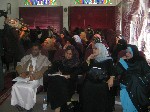 almotamar-net
almotamar-net - A civil society group held a meeting on Wednesday that brought together 150 women to discuss the most effective ways to raise awareness about the importance of female participation in upcoming elections.
Under the slogan, "Enhancing the role of women in local communities," the Foundation for Supporting Civil and Democratic Initiatives (MADA) looked for women willing to participate in local and presidential elections, scheduled for September.
"We've held this extensive meeting to draw a plan of action for spreading awareness about the importance of women's participation, both as voters and candidates," said MADA Chairman Abdul Majeed al-Fahd.
"We wanted to know what exactly we need to encourage women to take part in the election process, and also to encourage men to support them," he added.
At the meeting, British ambassador Michael Gifford, whose embassy supported the event, praised the role of Yemeni women in society.
Gifford went on to commend a recent decision by the ruling People's General Congress to reserve 15 percent of the country's decision-making positions for women, urging opposition parties to follow the suit.
Despite the conservative nature of Yemeni society, in which women's roles have traditionally been associated with the domestic sphere, there is no a legal obstacle preventing women from participating in elections, either as voters or candidates.
Nevertheless, statistics point to a recent decrease in the number of women running for office, even as female voter registration increases.
The number of women registered voters has almost trebled, from 15 percent of total voters in 1993 to 42 percent in 2003.
Concurrently, however, the number of female candidates fell in the same period from 42 to 11.
The number of women winning parliamentary seats has also shrunk, from 11 in 1990 (in the parliament of former South Yemen), to a single woman in the current 301-seat assembly.
Meanwhile, only two female appointees sit on the 111-seat Shura Council, the consultative upper house of parliament, members of which are directly appointed.

